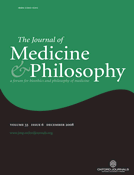-
Views
-
Cite
Cite
Rebecca L. Walker, Medical Ethics Needs a New View of Autonomy, The Journal of Medicine and Philosophy: A Forum for Bioethics and Philosophy of Medicine, Volume 33, Issue 6, December 2008, Pages 594–608, https://doi.org/10.1093/jmp/jhn033
Close - Share Icon Share
Abstract
The notion of autonomy commonly employed in medical ethics literature and practices is inadequate on three fronts: it fails to properly identify nonautonomous actions and choices, it gives a false account of which features of actions and choices makes them autonomous or nonautonomous, and it provides no grounds for the moral requirement to respect autonomy. In this paper I offer a more adequate framework for how to think about autonomy, but this framework does not lend itself to the kinds of practical application assumed in medical ethics. A general problem then arises: the notion of autonomy used in medical ethics is conceptually inadequate, but conceptually adequate notions of autonomy do not have the practical applications that are the central concern of medical ethics. Thus, a revision both of the view of autonomy and the practice of “respect for autonomy” are in order.



